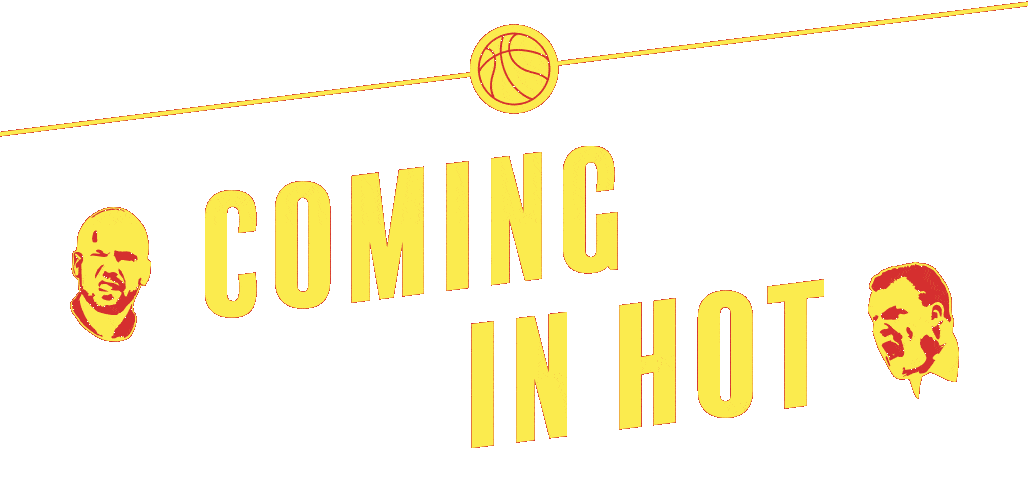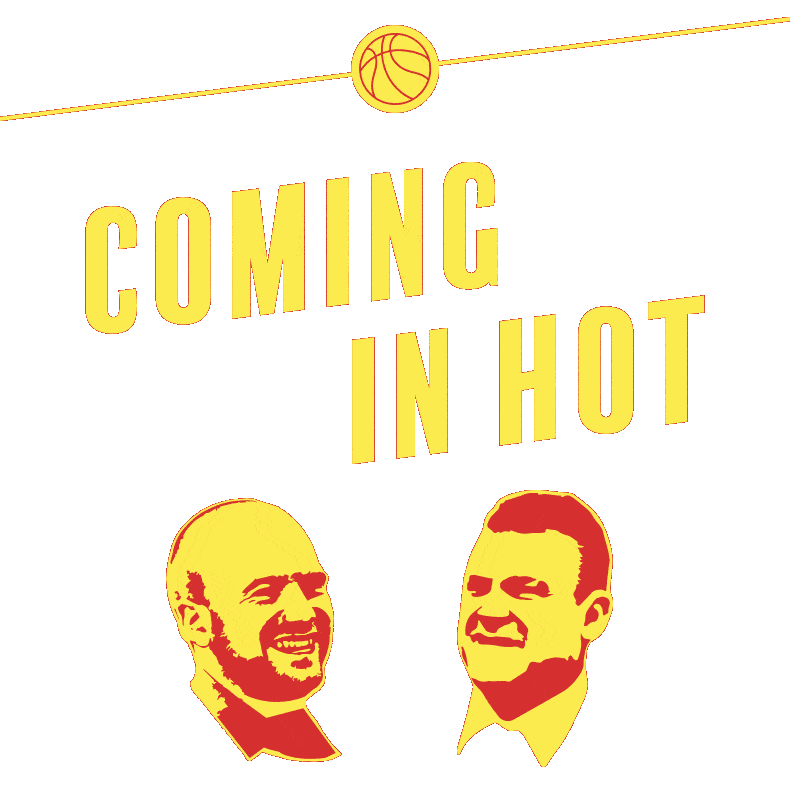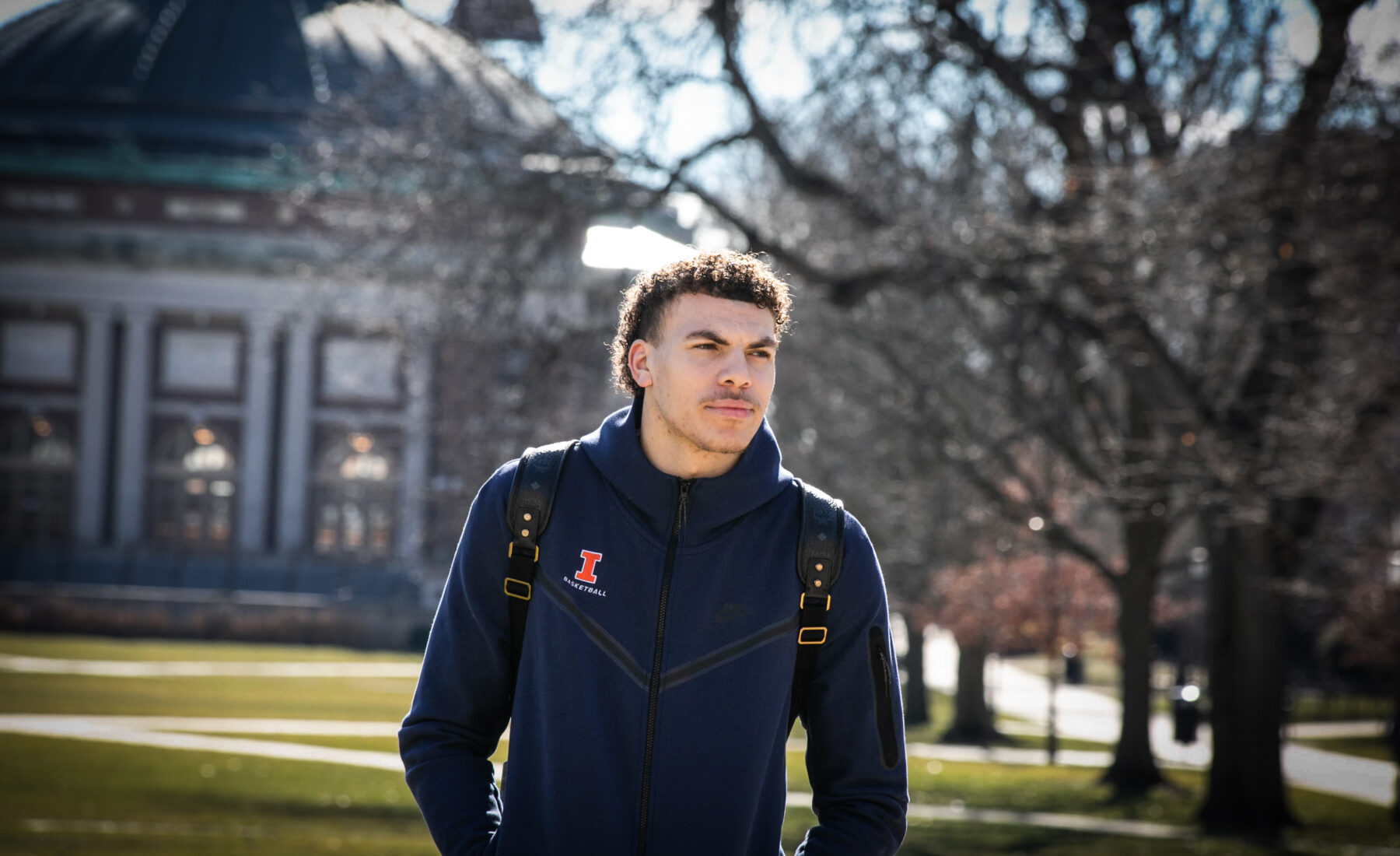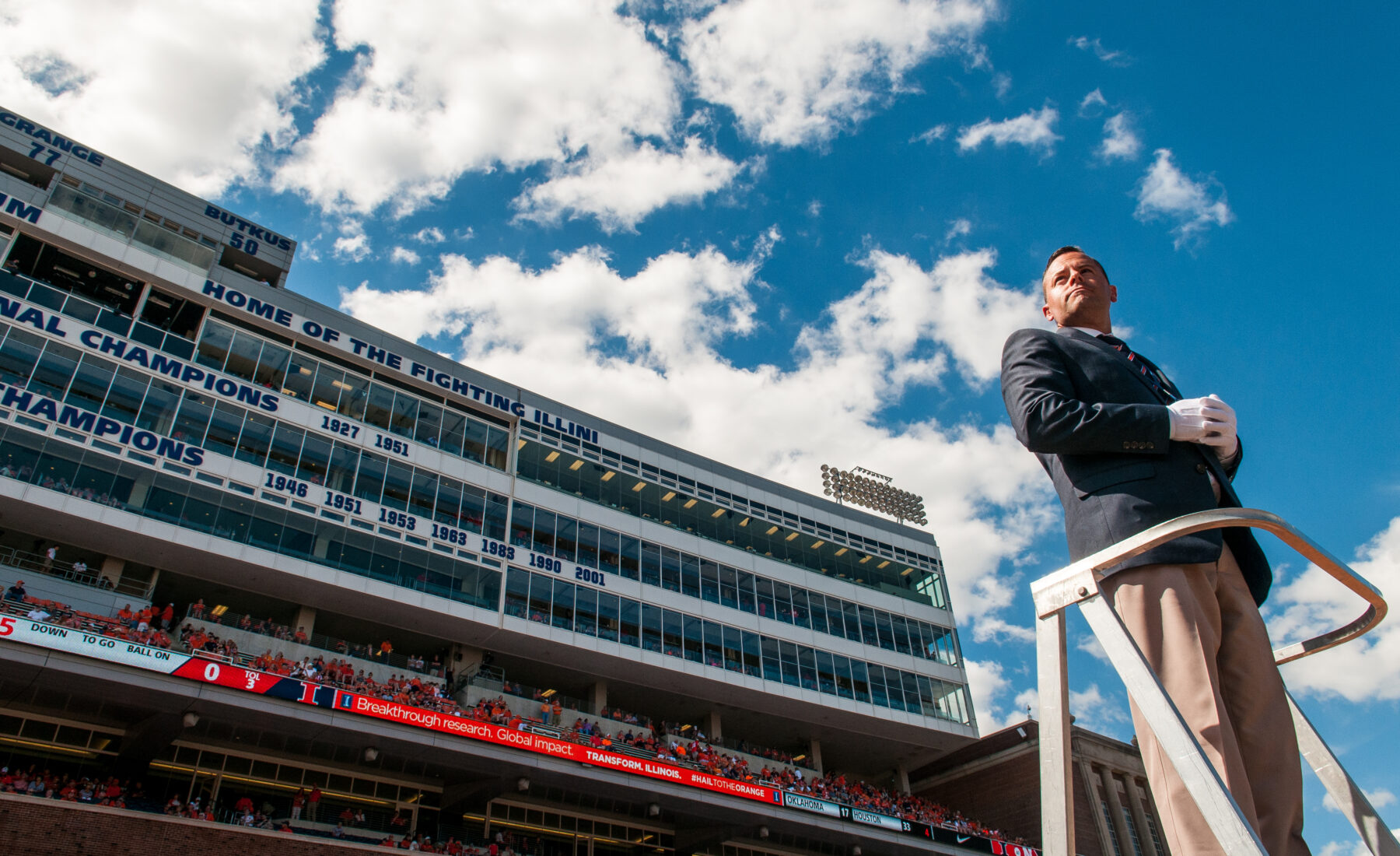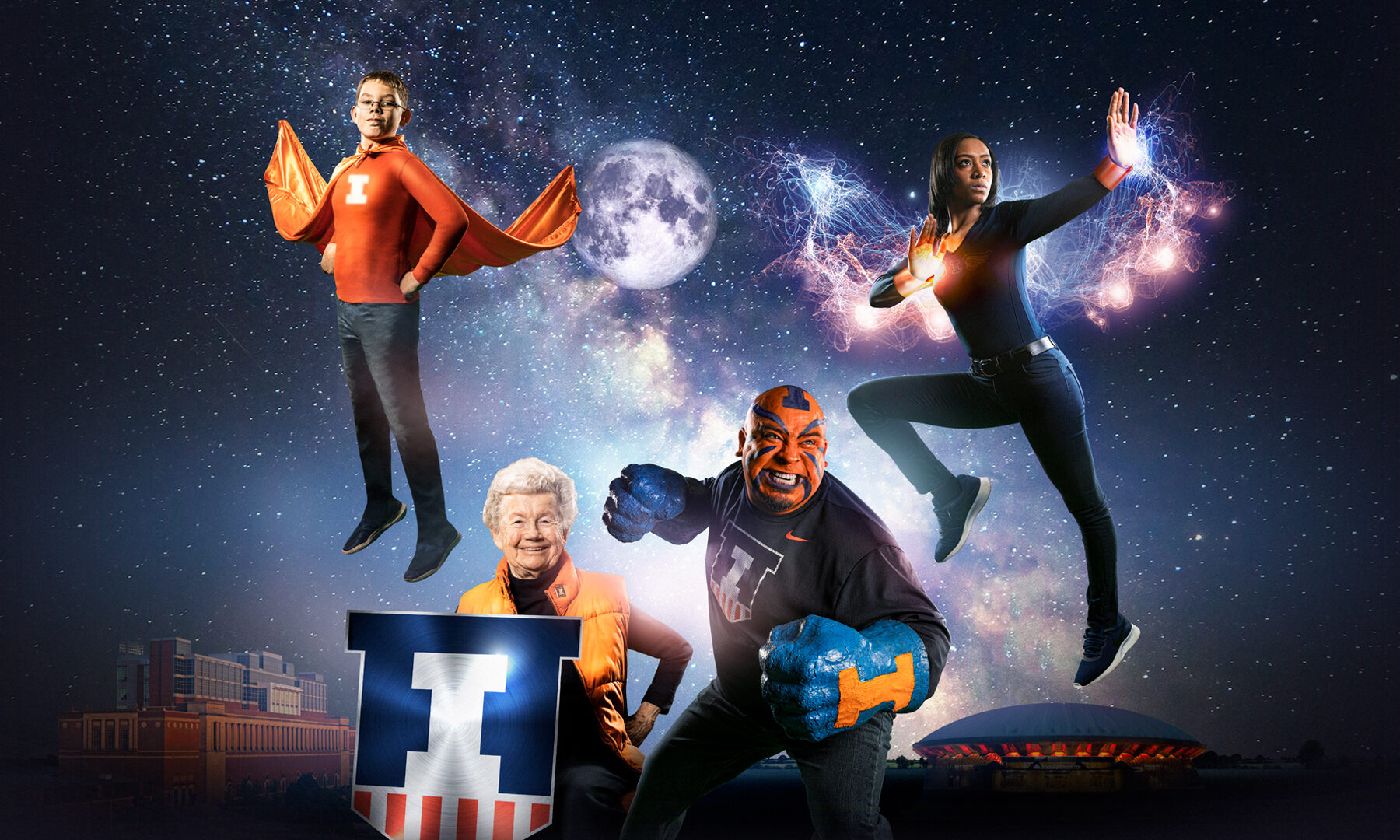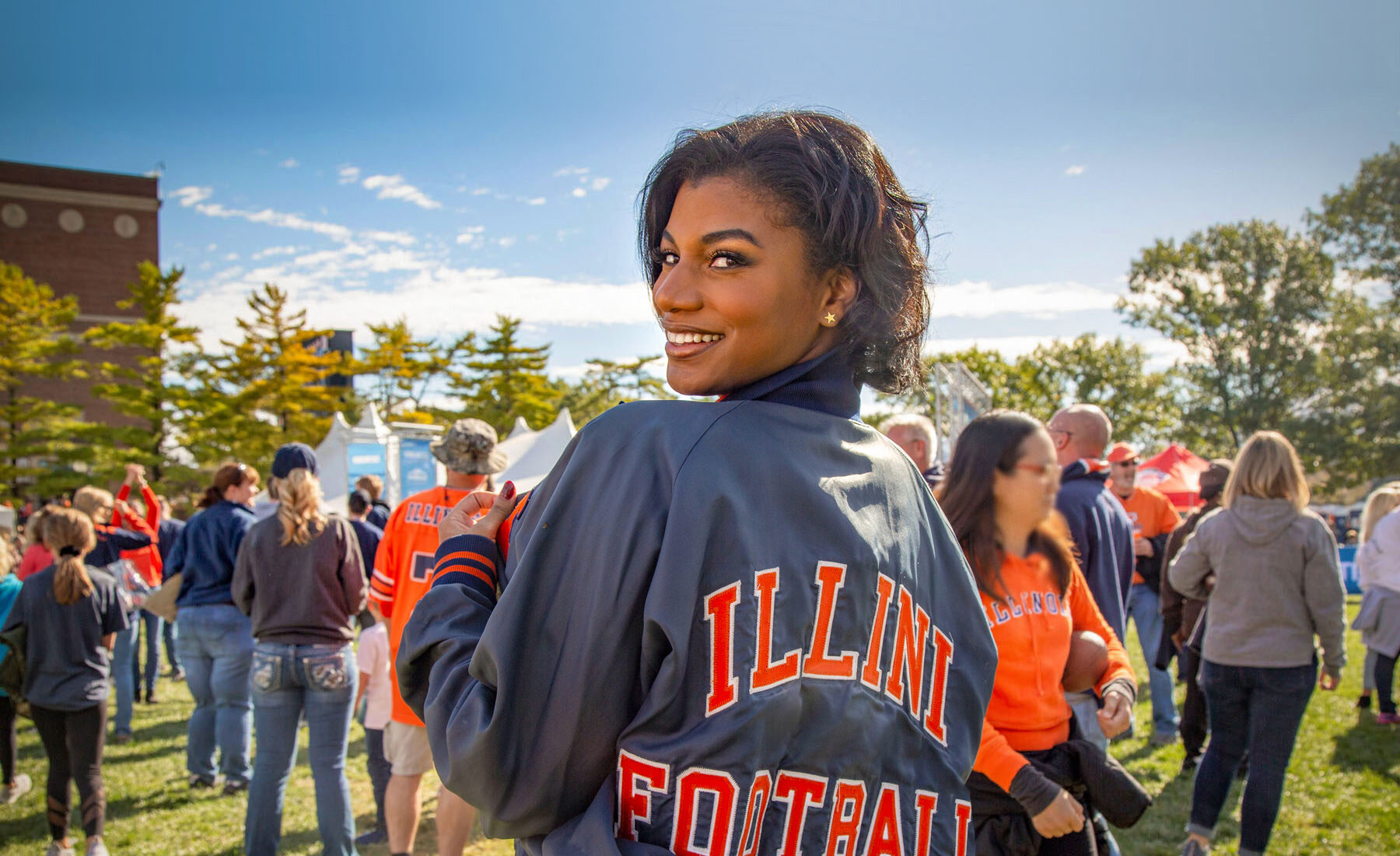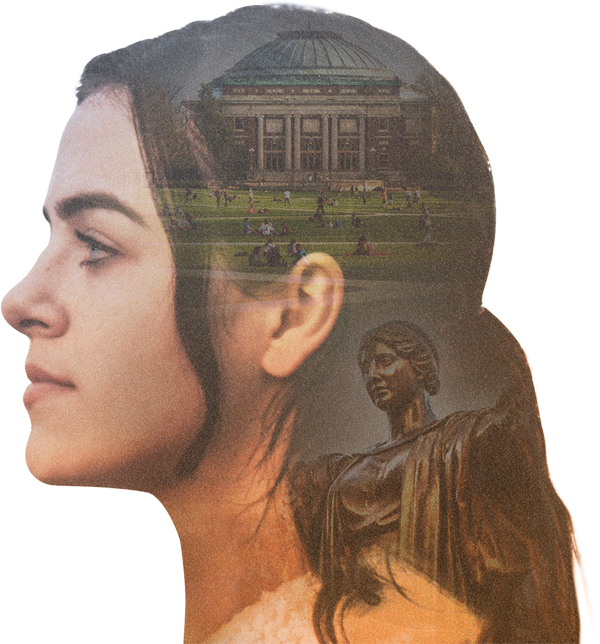Evans is known for his unique and disruptive style of interviewing celebrities—he mixes deep research and unpredictable questions with wings topped with increasingly fiery hot sauces which he and his guest eat during the interview. Started in 2015 with no budget and what he calls a “1980s cable access set,” Hot Ones, now entering its sixteenth season with hundreds of millions of views is a runaway success on YouTube.
This season’s guests include movie stars, pop stars, a UFC fighter and…our own Coach Brad Underwood.
While Evans was back on campus to record the episode with Coach, he was honored as a celebrity halftime guest at the Nebraska football game, toured campus via golf cart, and visited his portrait on the mural at Kam’s. This was his first trip back to campus since graduating in 2008 and the STORIED team sat down with him to find out how Da Bomb actually tastes and why he’s eaten the Carolina Reaper—twice.
As a host of a celebrity interview show, what are your thoughts on celebrity? Do you regard yourself as a celebrity?
What I try to do is not confuse my proximity to celebrity with celebrity. Hot Ones is basically a 1980s cable access set, which we started with a shoestring budget, and then a generic-looking bald guy, his hot sauces, and the wings. There’s no reason that a long-form talk show that’s presented in such a simple way should last sixteen seasons, but I think it does because I try to provide enough space so that the interview experience is always an extension of the guests’ personality. That way the viewer has a different experience every episode.
Celebrity is this thing that by definition is unobtainable for most of us, but what we do on the show is take celebrities and knock them off that pedestal by having them go through the pain and experience of hot sauce, which everyone can relate to.
That said, I never expected to leave my house and get recognized, but it happens all the time. YouTube makes you so widely recognizable. But I never personally think I am a celebrity or anything. I think I’m recognizable because the show’s big, but I feel like I’m the borderline. Like anybody above me can be defined as a celebrity, and then anybody below me is not, and I think I’m like the exact border. That’s kind of how I internalize it.
You don’t think being parodied on SNL pushed you over the line? That’s a pretty big deal.
The concept of celebrity is something that’s always evolving. When Elvis Presley broke through, it’s because TV had just started. You see this guy who’s on stage, and the way that he’s moving, and he becomes a new genre of celebrity. I think that would happen whenever there would be technological breakthroughs or mass broadcasting breakthroughs—a whole new class of celebrity was born. Now in the internet age, that process is just duplicating itself over and over, but faster and faster. Now you’ll have TikTok stars who, eyeball for eyeball, will draw more attention than Justin Bieber. So, how do you define that? Do you put that person in the same classification as you would a Justin Bieber or Beyoncé? Depends, I guess, on who you ask. Or it’s just that we’re living in kind of a wild, wild west time that’s ever evolving.
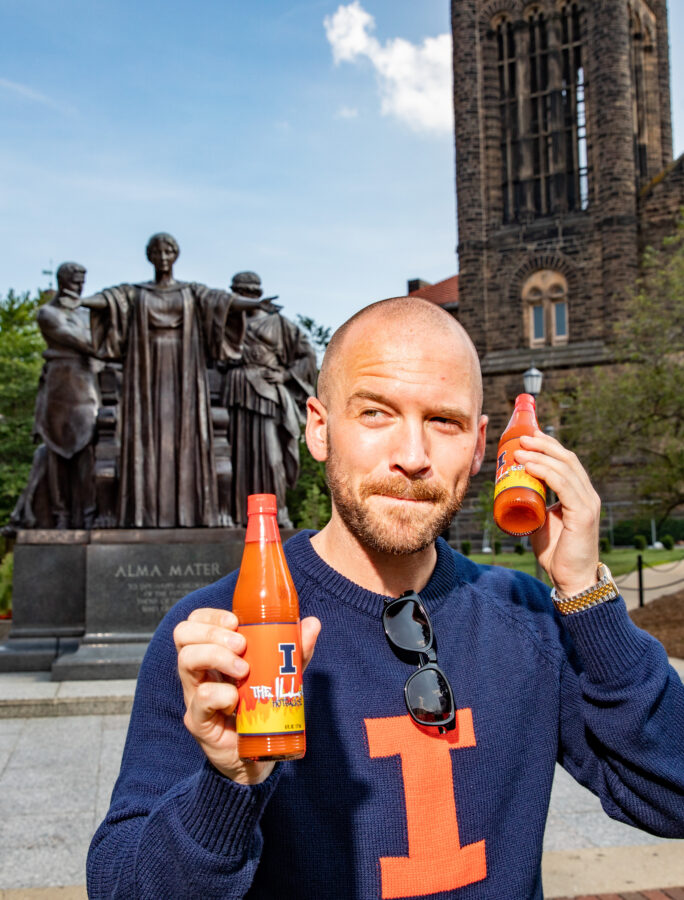
You’ve said in other interviews that you are sick of eating wings, but have come to love hot sauce.
If I’m off the clock, I’m not eating wings. I don’t want wings at a Super Bowl party or at a restaurant. But, maybe counter-intuitively, I’ve had the exact opposite experience with hot sauce.
We’ve worked with so many different hot sauce makers over the years. To hear the stories from the pepper farmers and some of the independently owned, family-owned hot sauce makers, and then to experience firsthand the way that the sauce transforms your meals has made me more passionate, more enthusiastic about hot sauce than I ever was. So, I’m forever a student of the hot sauce game.
There are some sauces I have on the show that become staples on everything I eat. Like the Torchbearer Horseradish sauce. I love it—it’s forever on my shelf. Dirty Dick’s hot sauce. Aggressive brand name, but delicious hot sauce, one of the best hot sauces I’ve ever had. Shaquanda’s is one of my favorite hot sauces ever, and now it’s got a permanent spot in my rotation as well.
On the show, there’s one sauce that has stood the test of time since it was introduced, and that’s Da Bomb Beyond Insanity, because the reactions are always just undeniable. It has a reputation larger than the sauce lineup itself, maybe even bigger than the show.
Can you explain how Da Bomb tastes?
Definitely. It basically tastes like a prank. It tastes like a setup, you know, it just is so jarring. Because we try to have sauces on the show that are hot, that push our guests, but that have redeeming culinary qualities. That are actually good. And that’s a difficult needle to thread when you’re working with a hot sauce, to make something that’s super spicy, that’s maybe even a little bit painful, but so delicious that you don’t want to put down the wing. But Da Bomb has none of those redeeming qualities. Your body will immediately reject it like its poison. Plus, it is so spicy and so painful. It’s been compared to battery acid on the show. I think people are recoiling because it tastes awful, and then reacting because it is so spicy.
But then what happens is the last two sauces after that don’t get the same reaction. Guests have said that they’re so torched out that it’s numbing. Once you take on that hot sauce, you can kind of conquer anything. What we’ve found is that it is a nice byproduct because it lands the show. You know what I mean? Now we purposely have a little bit of a downshift so that we can land the episode in place that’s nicer. You need a release to undercut the tension a little.
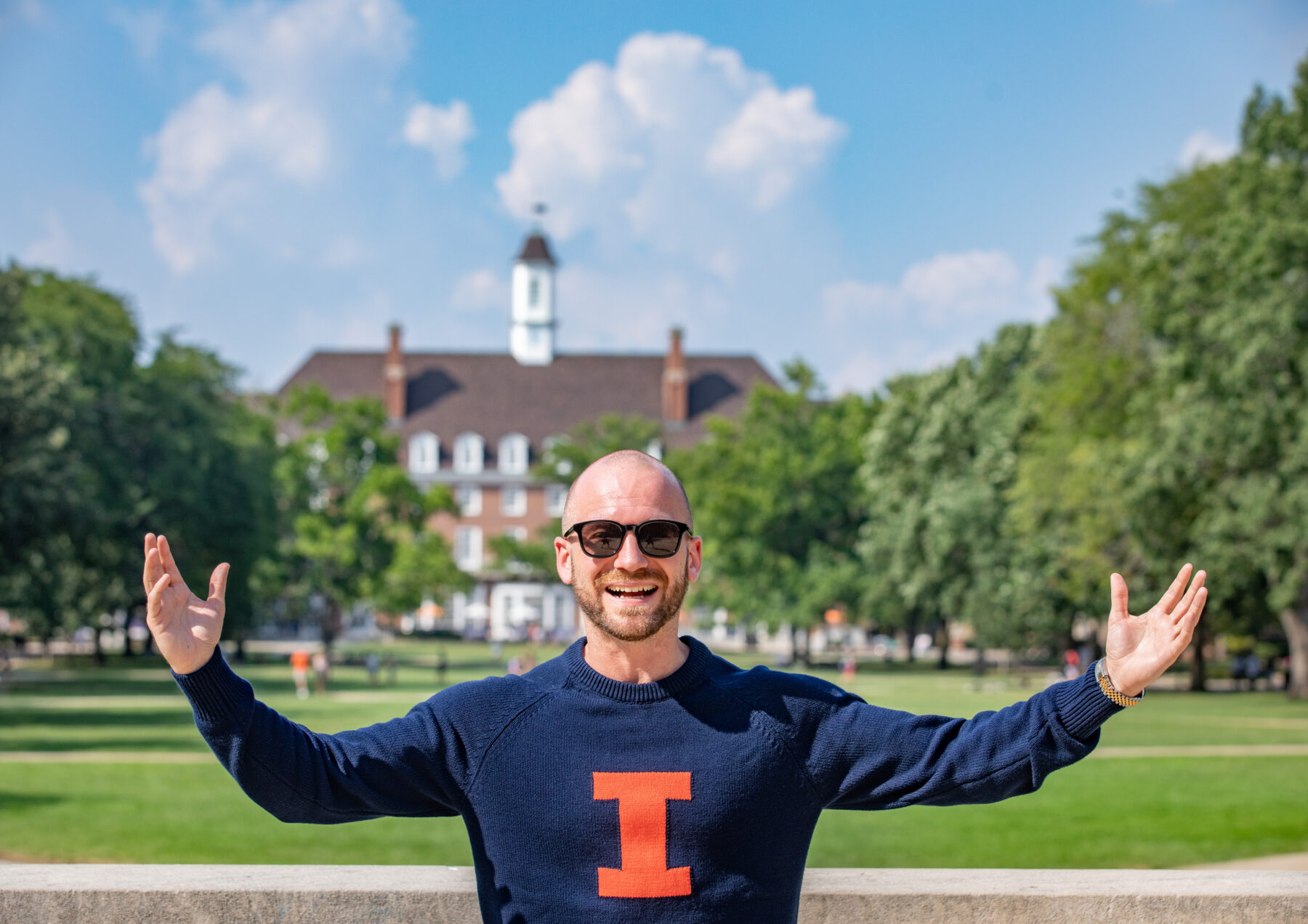
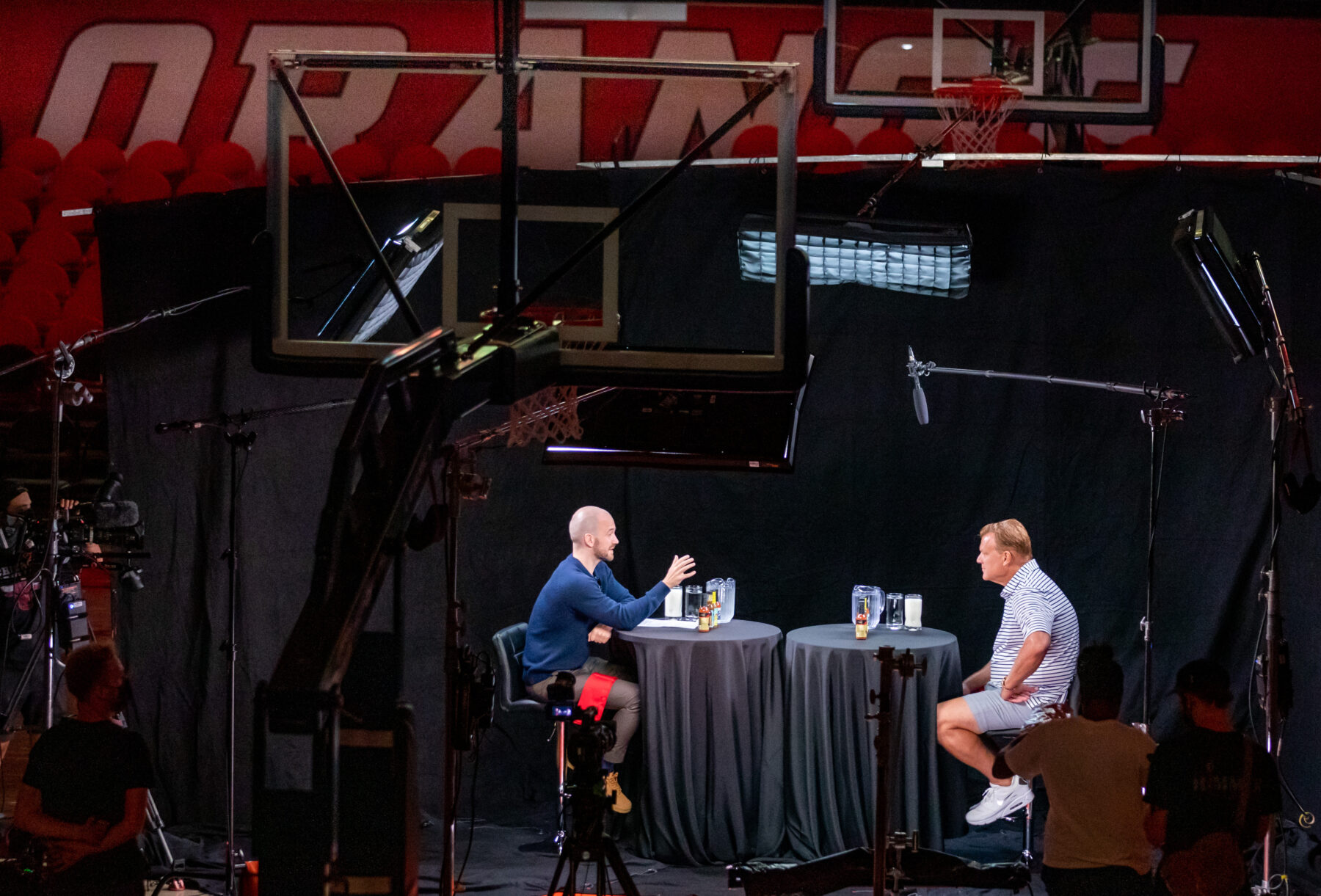
Let’s talk about the Carolina Reaper, the world’s hottest pepper. Can you explain what led to your first time tasting it? And why did you go back?
So, this guy, Chili Klaus, caught our attention. He was doing a kind of high concept version of our show in Denmark. For example, he’d be the conductor of an orchestra and everybody in the symphony would hold up a ghost pepper, and then they’d eat it. And while everyone’s dying on the ghost pepper, they lift their instruments and try to do this symphony performance, all while they’re all dying on ghost peppers. And I was like, “Wow, that’s kind of like a high concept version of what we’re doing with the celebrity interview, where we have this disruptive element in it.”
So, we got him to New York, and had to do something big. Originally, we had different types of peppers, and we were going to have Chili Klaus explain the stories behind them. And Chris Schonberger, who I do the show with, tells me, “We have the Carolina Reaper because we’re just going to talk about it. Don’t eat the Carolina Reaper. I don’t want to be liable for what happens.” And when I sat down with Chili Klaus, he said, “Now we have to eat the Reaper.”
So, we eat this Carolina Reaper, and it’s like a ten-hour-long experience. It’s like giving yourself food poisoning. At first it tastes almost like the freshness of an apple, and then the heat cranks up. It was intense. But it was one of the first videos that we ever had break containment, where we wake up the next day and it’s got millions of views and is on the front page of Reddit.
I did swear off the Carolina Reaper after that first one, but then Chili Klaus came back to town. The sequel had to be bigger and better than the first one. We ended up doing like a romantic horse and buggy carriage ride in Central Park. And I remember Chili Klaus eating the Carolina Reaper, and then jumping out of the carriage while it was moving. There is this nice couple sunbathing in Central Park, like a peaceful moment, and Chili Klaus just keeled over next to them vomiting all over the grass. That’s the story of the Carolina Reaper saga.
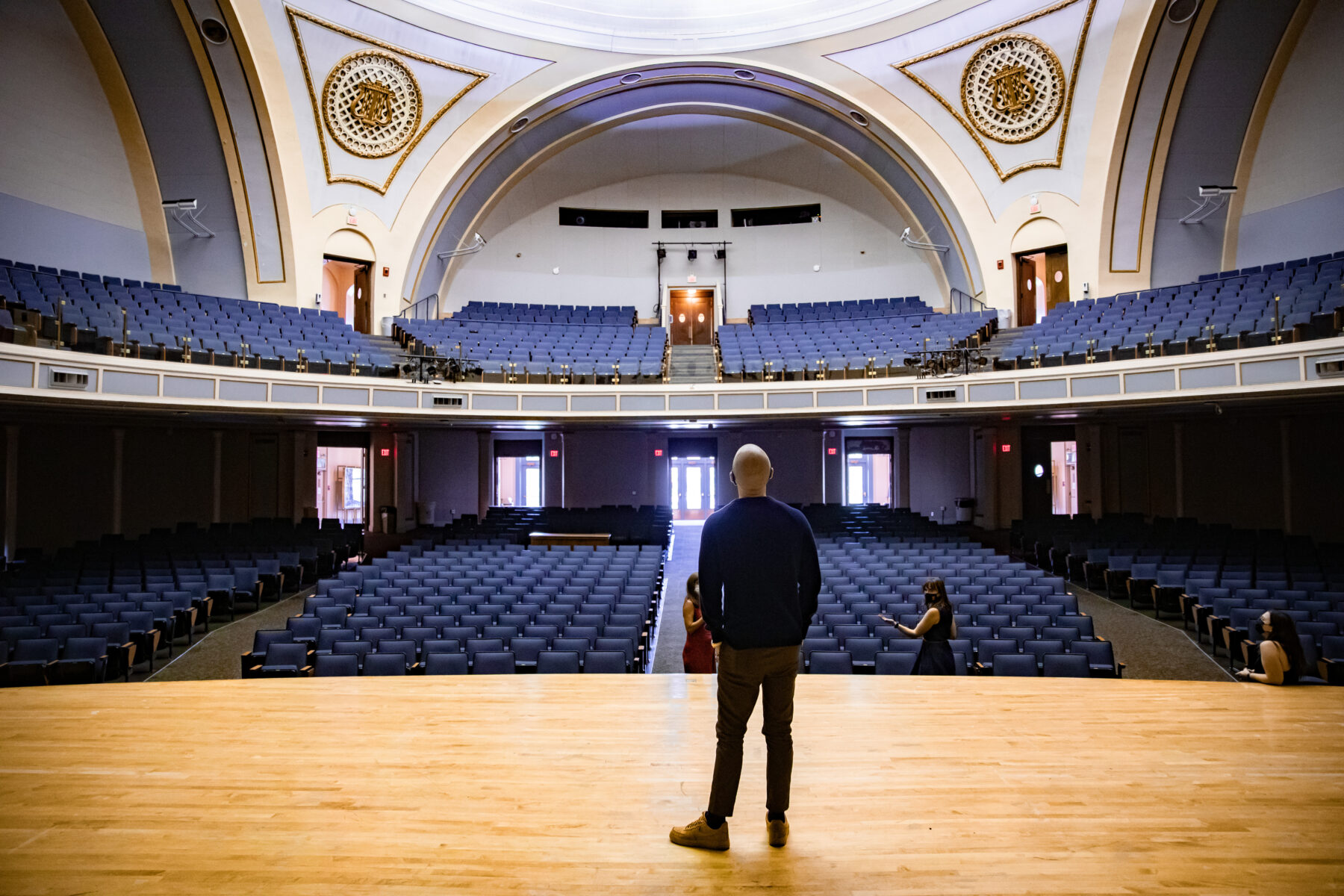
While we’re talking heat, do you have any tips for fans on campus for building their dorm room arsenal of hot sauces?
You know, I didn’t have some sort of crazy spice tolerance and decide that because I have this gift, I want to create a whole show around it. It wasn’t like that at all. Originally, the problem we wanted to solve was how do we do a celebrity interview show and make it not boring? And we were like, well, what if we had guests eat increasingly spicy chicken wings over the course of the interview, as a way to take celebrities who were caught in this PR-driven flight pattern, and disrupt it? Little did I know that I’d be doing the show for seven years. I ended up having to build my spice tolerance.
Start at a Frank’s, start at a Cholula, and then work your way up. It’s hard at first, but every time you do it, it gets a little bit easier. When we sit down with a guest on Hot Ones, it’s not necessarily that the guest is experiencing more pain than I’m feeling, or experiencing a deeper burn than I’m feeling. I feel all of those things the exact same way. It’s just that I don’t experience the panic, because I’ve been there before.
Can you tell us your Mount Rushmore of Illinois alumni?
Oof. Ok. Well, I’m from the College of Media, so I gotta put Roger Ebert up there, and that’s sacred. I’m going to put my mom up there, of course. She graduated with a political science degree. Definitely Professor John Paul. Then I’ve got to put an athlete. I was here during the Deron Williams, Dee Brown basketball era, and the Rose Bowl team with Juice Williams and Rashard Mendenhall and Vontae Davis that was special to me. But I think the thing that brought about this homecoming was the way I fell in love with last year’s basketball team. Ayo Dosunmu recently got drafted by the Bulls. I’ll be with Ayo for the long haul, so let’s put Ayo up there.
You’ve talked about tentpole episodes of the show such as Kevin Hart or Key and Peele, moments that you knew Hot Ones was going somewhere big. What are the experiences as an Illinois student that you now look back on as your own tentpole moments?
I grew up idolizing Howard Stern, David Letterman and Jimmy Kimmel. I loved listening to Adam Carolla on Loveline. I knew exactly what I wanted to do, which is why I came here and majored in broadcast journalism. I thought I was going to graduate, get an internship at ESPN Radio in Chicago, or 670 The Score and end up being some radio producer. I could have done that and that would have been, to me, a dream come true.
I spent a couple years being an okay broadcast journalism student, but not a standout. I think I turned a corner in the second semester of my junior year, and then took a giant leap forward to a different level my senior year. And I felt like, wow, this is something that I can really do for the rest of my life.
We used to do these live student broadcasts every Friday. Did you ever see that YouTube clip of that kid that’s like, boom goes the dynamite? He’s panicking on this livestream broadcast and I always think it’s amazing that more of those things are not on YouTube. Every Friday there’d be two or three “boom goes the dynamite” moments.
The sink or swim moment for people was always on weather. On weather, you’re just on a green screen, working off just the monitors that are all opposite your instincts, rifling through those slides. You don’t have a prompter. And nobody practices doing weather. But I liked that it didn’t have a teleprompter. I liked that it was just filling two-and-a-half minutes of space, going live and just trying to keep the boat from sinking. Professor John Paul took me aside and said, “You know, nobody does weather like that. You’re so glib. I don’t know if you’ve thought about this, but you should be a weatherman.” That was him saying there was a skill or a talent there that I could nurture and do something with. I just wanted to get on TV, and I knew from being obsessed with David Letterman that he started out as a weatherman. So, alright, cool, that’s my path. I’m going to be a weatherman. But when I went back to Chicago, nobody was hiring. I did architecture tours of the Chicago River in the summer before I bounced around unpaid internships at PR agencies and finally got a job as a copywriter. There’s a great Steve Jobs quote about not being able to connect the dots looking forward, only looking back. I think that’s a good lesson. A lot of people will compare themselves to their peers, or they’ll get competitive with them, but everybody has different timeline.
I look back and think about my time here, and especially those classes and Professor John Paul. I credit him with instilling that confidence in me. Without that confidence, I don’t know if I could have done any of this.
It sounds like being here was a really special experience for you.
Yeah, I mean, my mom went here, my dad went to Northwestern, so I grew up in a Big Ten household, rooting for the Illinois basketball team. My mom unfortunately passed when I was in high school, but I always think about and value how proud she would be of me for following in her footsteps and going to Illinois. And I do think that combined with following the broadcast journalism path, meeting the right professors, finding what works for me—it was all incubated here. To this day, I still have a relationship with John Paul. The things that I learned here and the things that I experienced all had a major impact on what I’m doing now. Without me going down this path exactly as it happened, there’s no way I’d be where I am. So, yeah, I’m indebted to the school, I appreciate the school, and I love the school.
